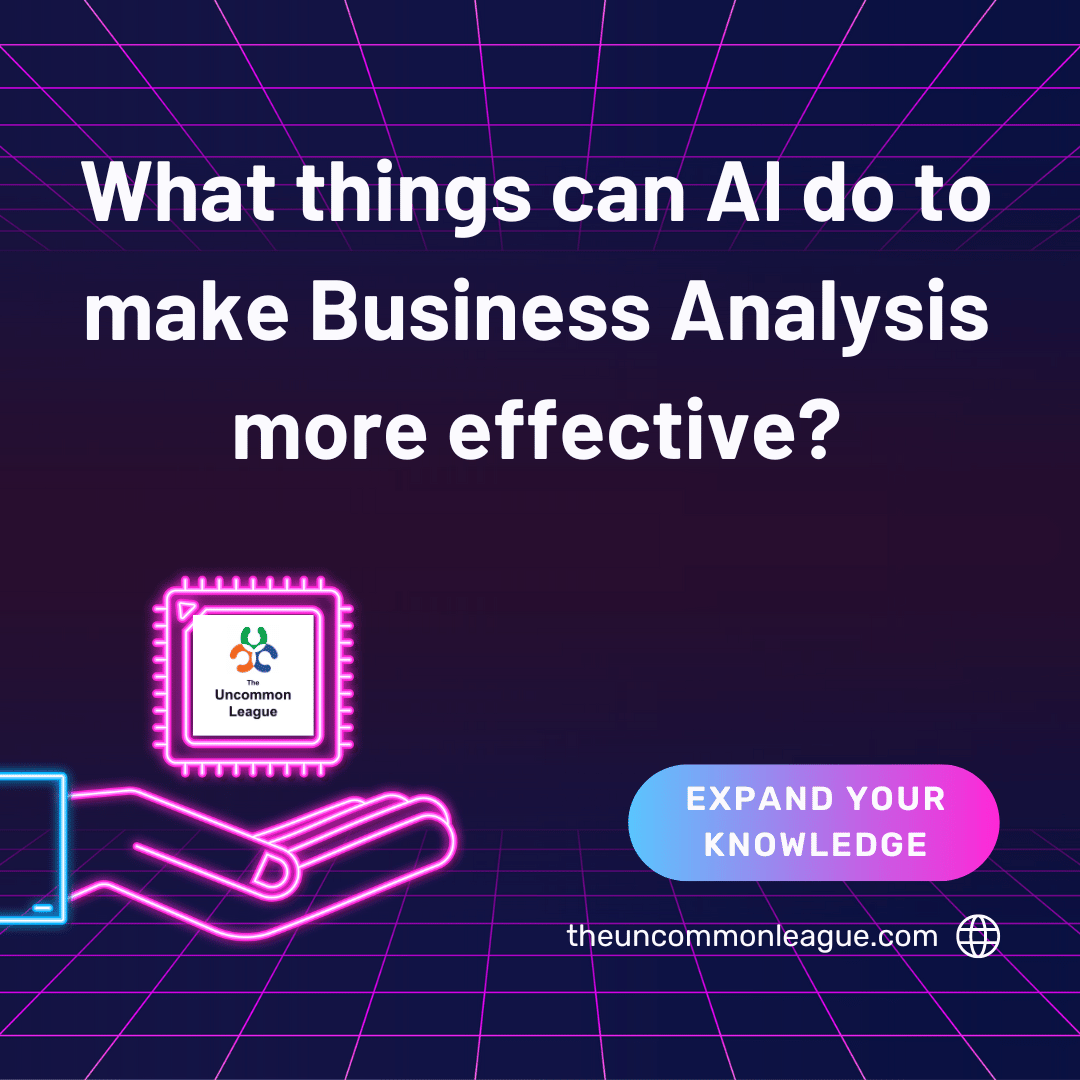What things can AI do to make business analysis more effective?
If you read, “Expeditionary Force” by Craig Alanson you would understand that whenever I think of artificial intelligence, I see this mental picture in my head of a super powerful intelligence commanding a space ship all the while talking like a California surfer dude. Like whoa dude. It would be fascinating to have a conversation with AI, but I’m not sure I want to get into a lengthy discussion about turning the kitchen lights on.
I often find myself pondering the transformative potential of Artificial Intelligence (AI) in enhancing the effectiveness of business analysis. In this article, we'll delve into the realm of AI, dispelling myths, and exploring the myriad ways it can revolutionize the field of business analysis.
First and foremost, let's address the elephant in the room: the confusion surrounding what AI is and how it operates. AI is not some mystical force from a science fiction novel; rather, it is a suite of technologies that enable machines to simulate human intelligence. These technologies include Machine Learning, Natural Language Processing (NLP), and computer vision, among others. At its core, AI learns from data, identifies patterns, and makes predictions or decisions—capabilities that can be harnessed to supercharge business analysis.
So, what things can AI do to make business analysis more effective? Let's dive in.
Data Processing and Analysis: One of the most significant contributions of AI to business analysis is its ability to process and analyze vast volumes of data at lightning speed. Gone are the days of manual data entry and cumbersome spreadsheet analysis. AI-powered tools can sift through mountains of data, identify trends, and extract actionable insights in a fraction of the time it would take a human analyst.
Predictive Analytics: Predicting future trends and outcomes is a cornerstone of effective business analysis. AI excels in this arena, leveraging advanced algorithms to forecast market trends, customer behavior, and business performance with remarkable accuracy. By harnessing the power of predictive analytics, business analysts can make informed decisions and develop proactive strategies to stay ahead of the competition.
Automated Reporting and Visualization: Communicating insights effectively is essential in driving organizational change. AI-enabled tools can automate the process of generating reports and visualizations, transforming raw data into compelling narratives and interactive dashboards. This not only saves time but also ensures that stakeholders have access to timely, relevant information to support decision-making.
Natural Language Processing (NLP): NLP is a game-changer for business analysis, enabling machines to understand and interpret human language. AI-powered NLP tools can analyze unstructured data sources such as customer feedback, social media posts, and news articles, extracting key insights and sentiment analysis. This provides business analysts with a more comprehensive understanding of market dynamics and consumer preferences.
Anomaly Detection: Identifying anomalies or outliers in data is crucial for detecting potential risks or opportunities. AI algorithms can flag unusual patterns or deviations from the norm, alerting business analysts to investigate further. Whether it's detecting fraudulent transactions, unusual website traffic, or unexpected fluctuations in sales, AI-powered anomaly detection can help businesses stay vigilant and responsive to emerging threats or opportunities.
Personalized Recommendations: AI-driven recommendation engines have become ubiquitous in e-commerce and content streaming platforms. However, their applications extend far beyond consumer-facing industries. Business analysts can leverage AI to provide personalized recommendations to stakeholders, whether it's suggesting optimal pricing strategies, product recommendations, or investment opportunities tailored to individual preferences and objectives.
Process Optimization: AI can streamline and optimize business processes, reducing inefficiencies and costs. Whether it's automating routine tasks, optimizing supply chain logistics, or improving customer service through chatbots, AI-driven process optimization can free up valuable time and resources for business analysts to focus on higher-value activities such as strategic planning and innovation.
April 15 - 17, 2024 (3 Days)
9:00 am (Central) until 5:00pm (Central)
Online - Live Instructor
Continuous Learning and Improvement: One of the most remarkable aspects of AI is its ability to learn and improve over time. Machine Learning algorithms can adapt to changing data patterns, refine their predictive models, and continuously optimize decision-making processes. This iterative learning process not only enhances the effectiveness of business analysis but also fosters a culture of innovation and continuous improvement within organizations.
The potential of AI to enhance the effectiveness of business analysis is boundless. From data processing and analysis to predictive analytics, NLP, anomaly detection, and process optimization, AI-powered technologies offer a myriad of opportunities to unlock actionable insights, drive informed decision-making, and fuel organizational growth. As business analysts, embracing AI as a strategic ally rather than a threat is key to harnessing its transformative potential and staying ahead in an increasingly competitive landscape. So, let's embrace the AI revolution and unleash its power to revolutionize business analysis as we know it.
Tags #businessanalysis #ai


